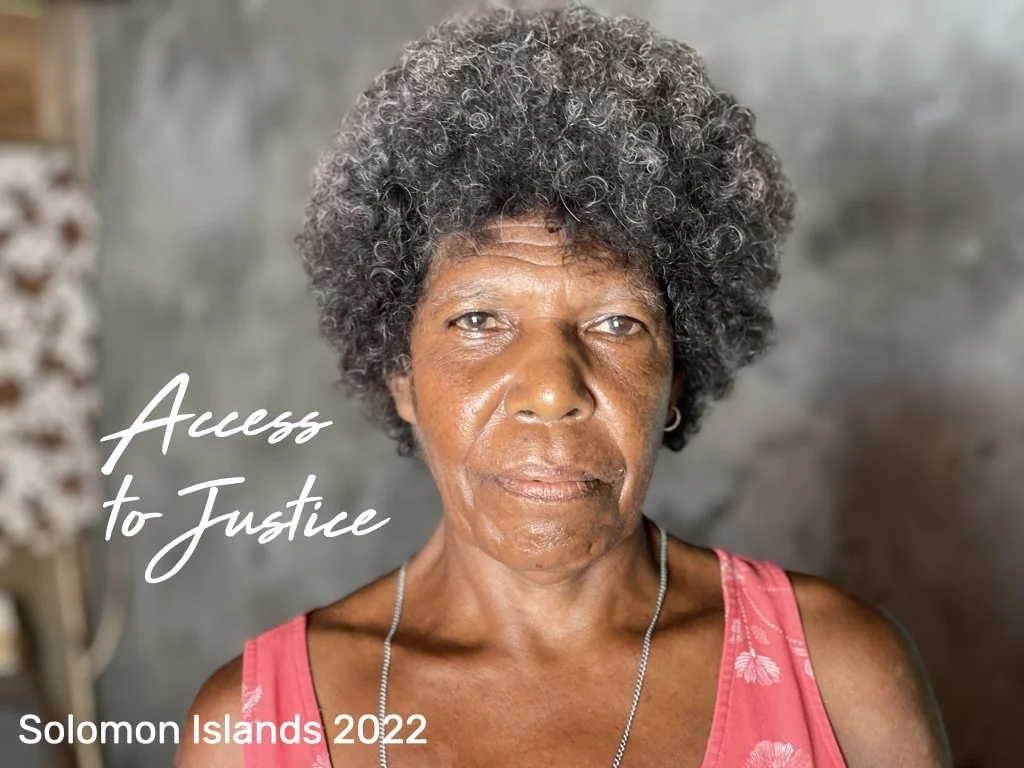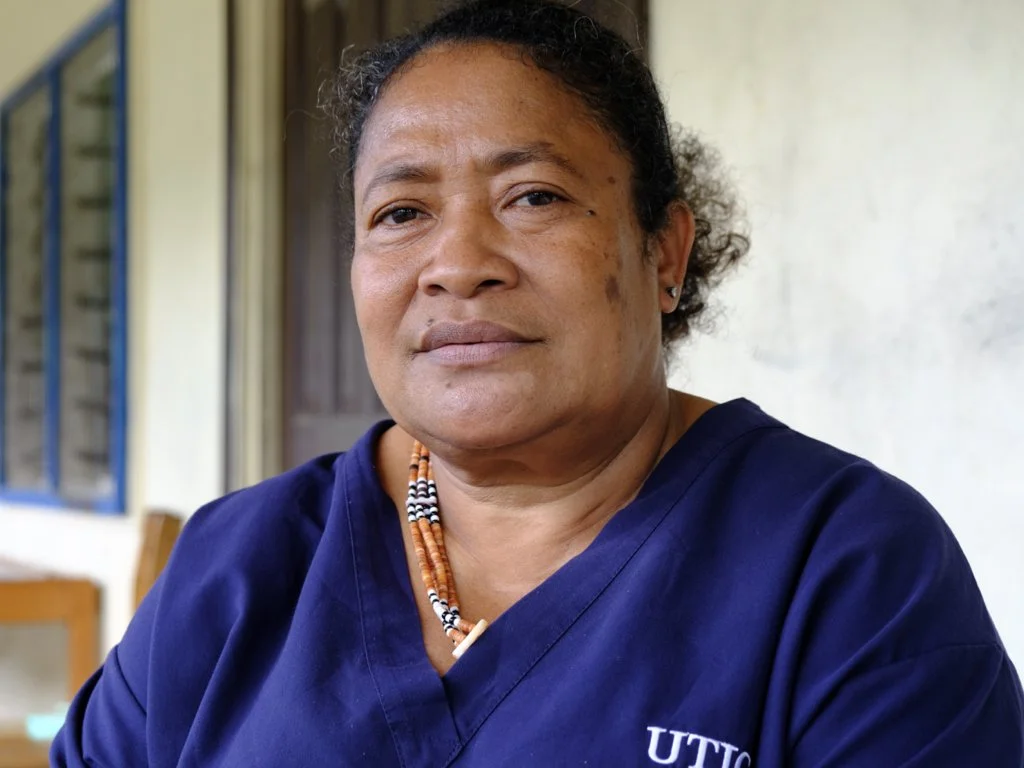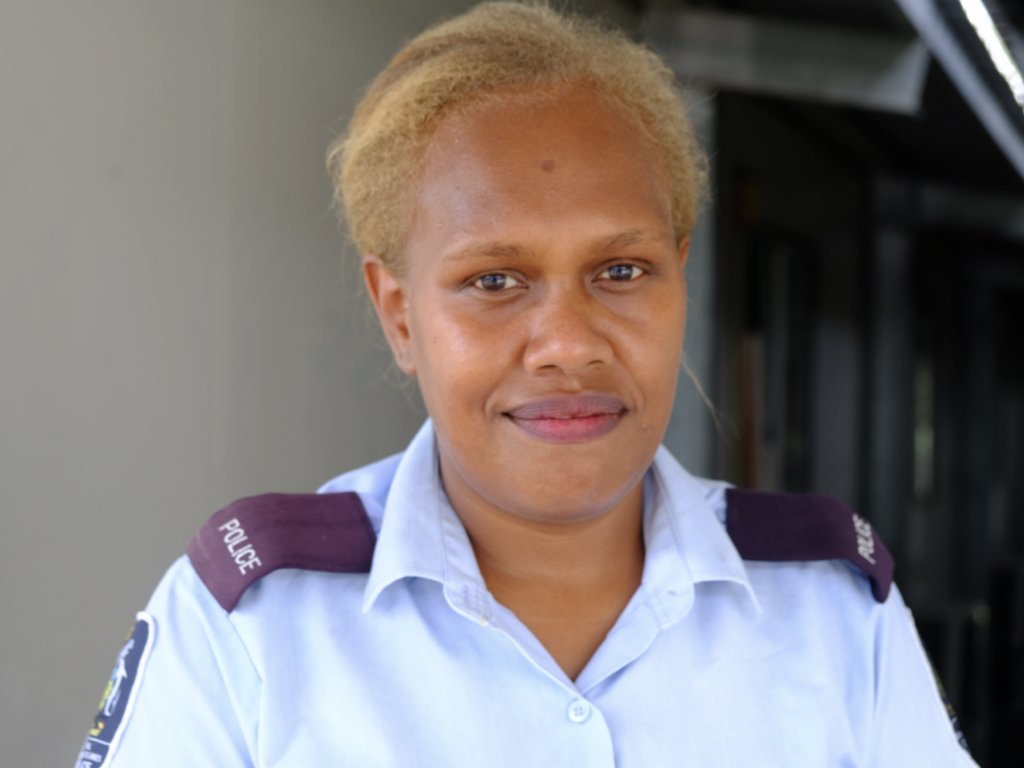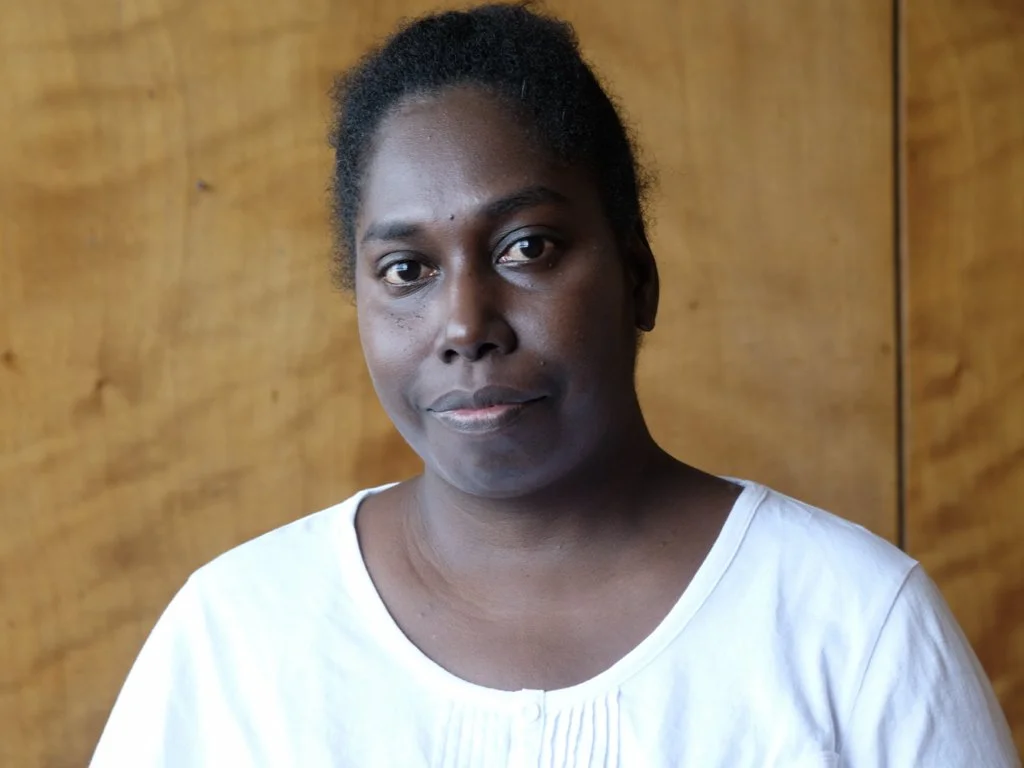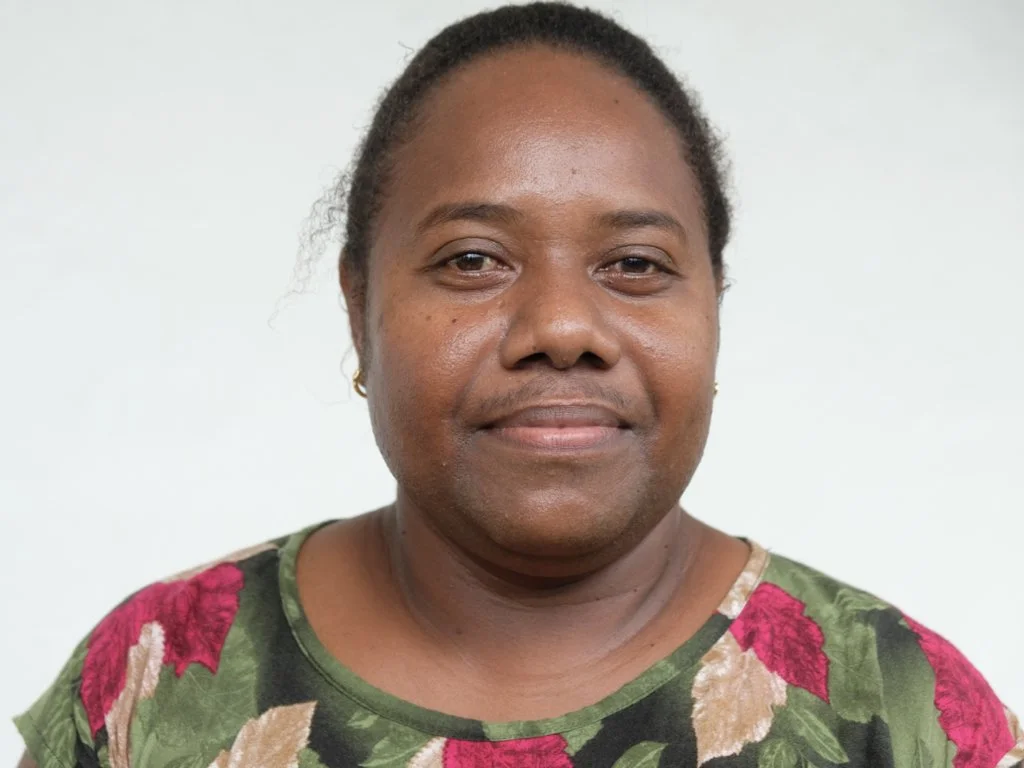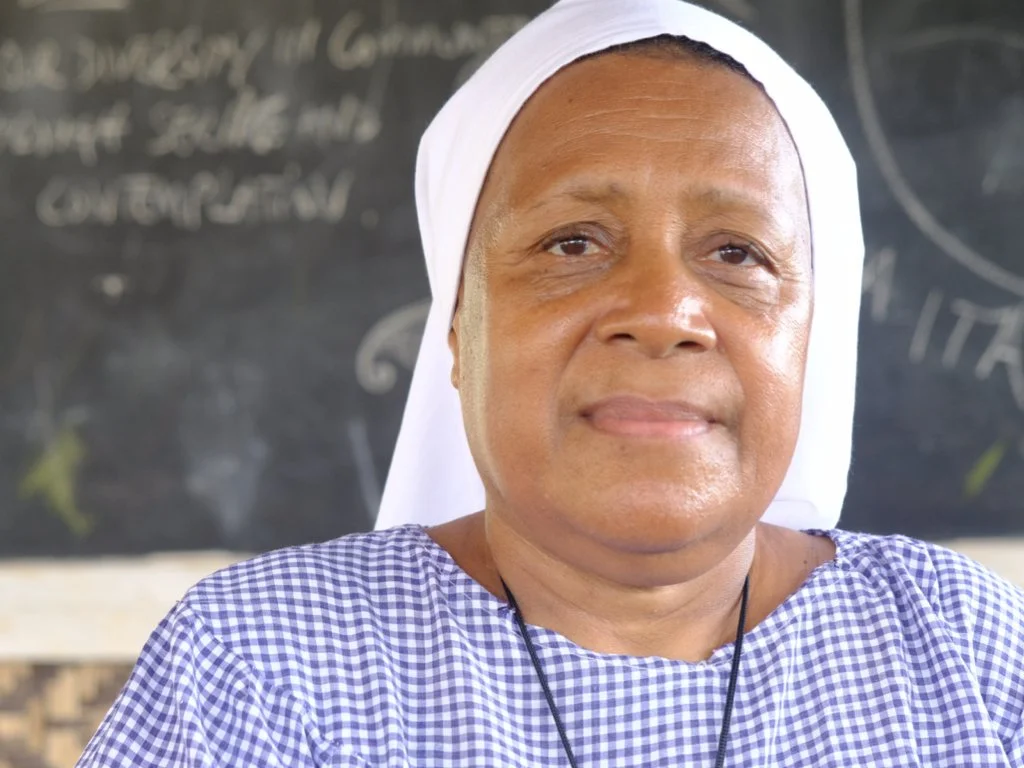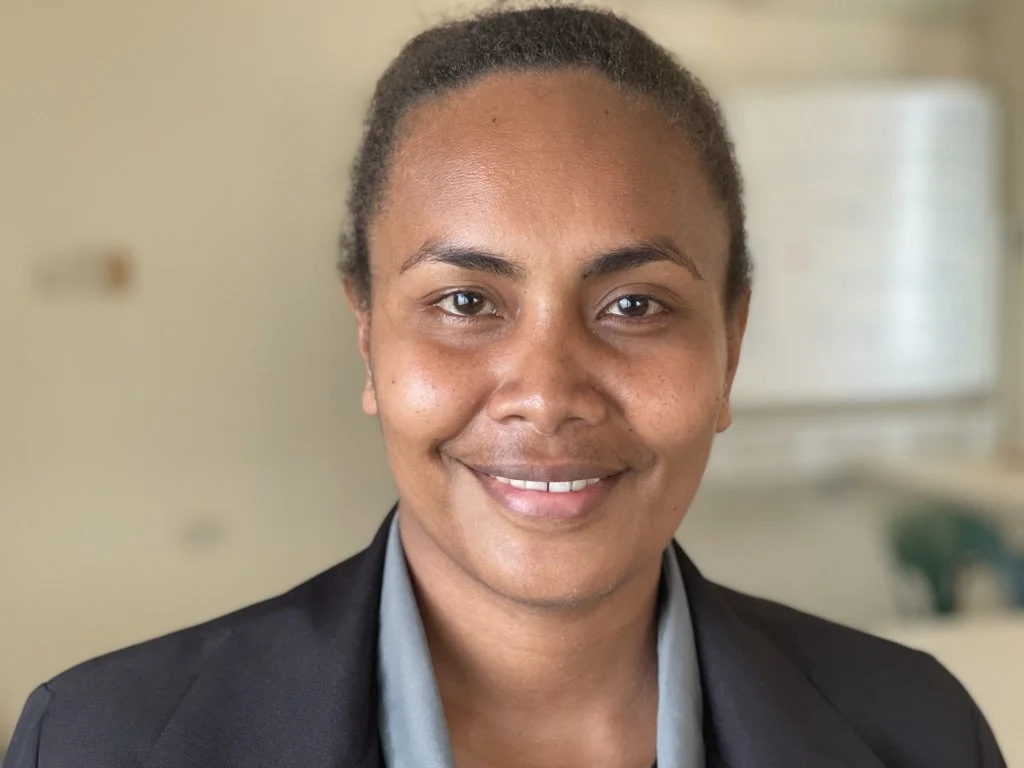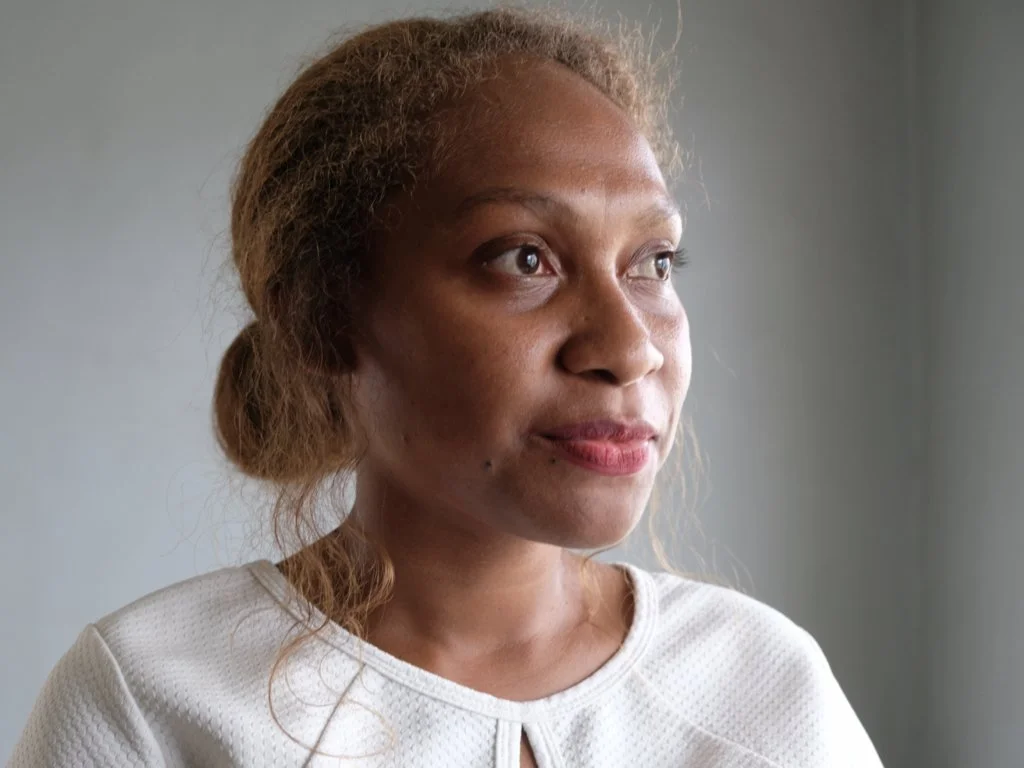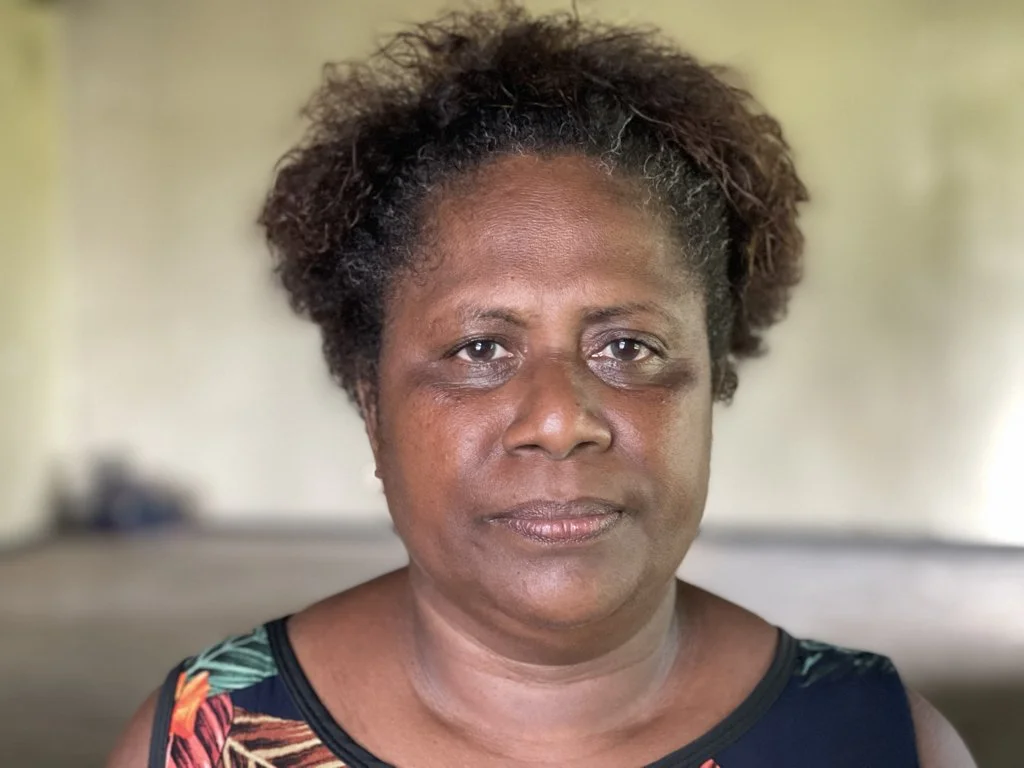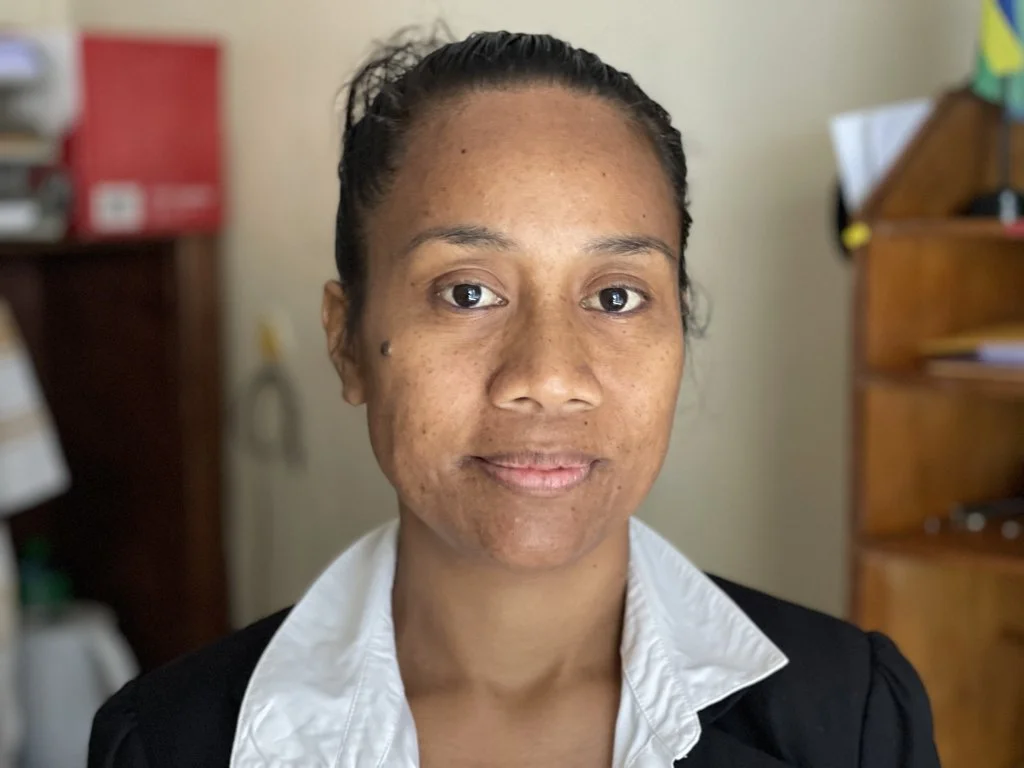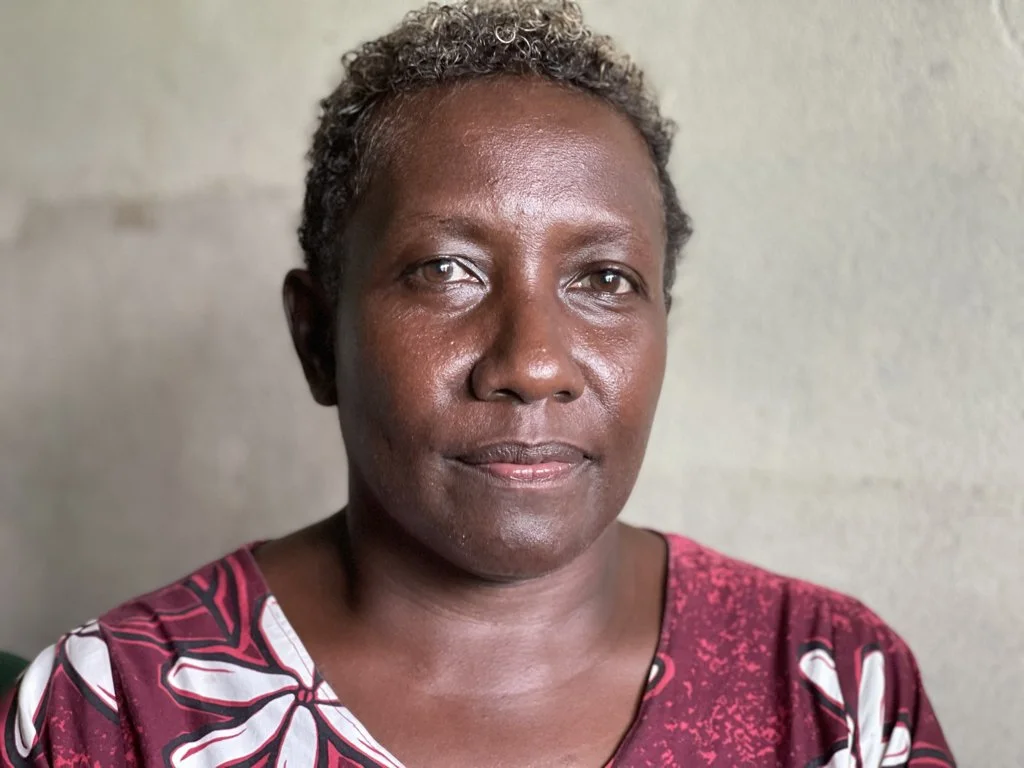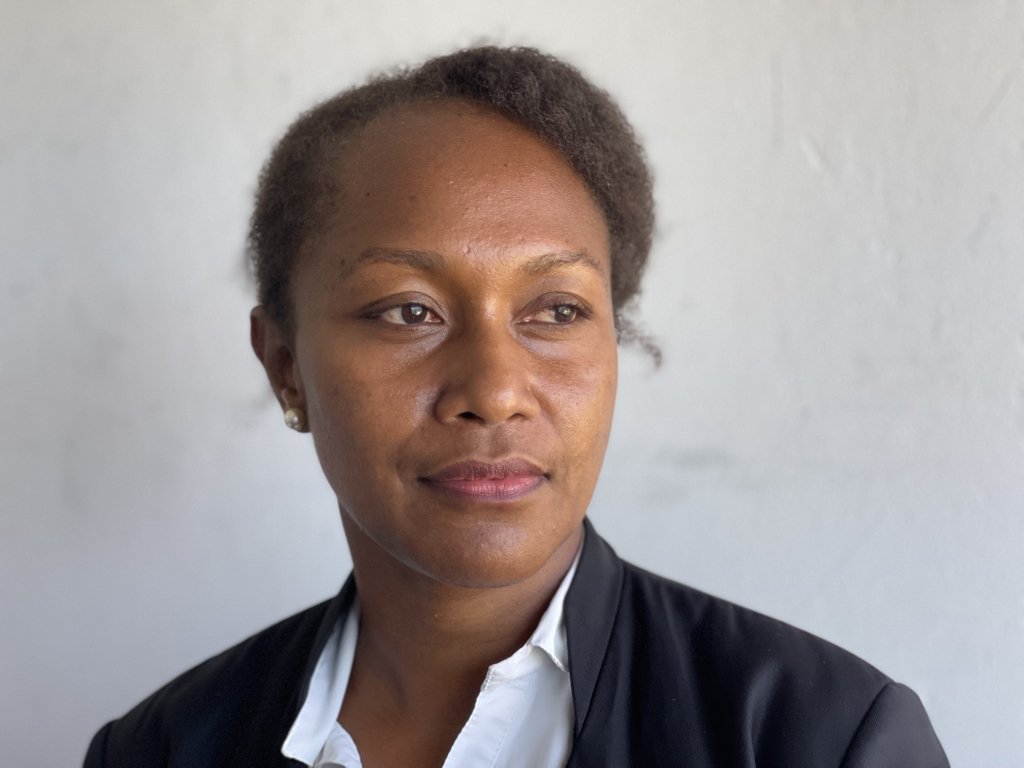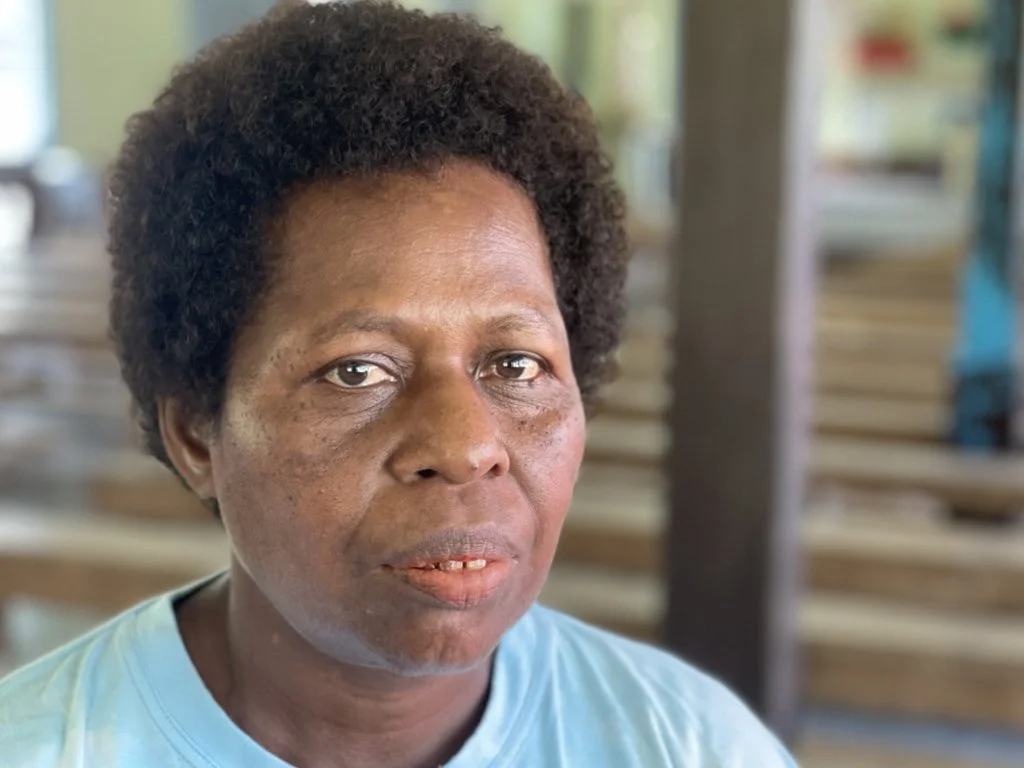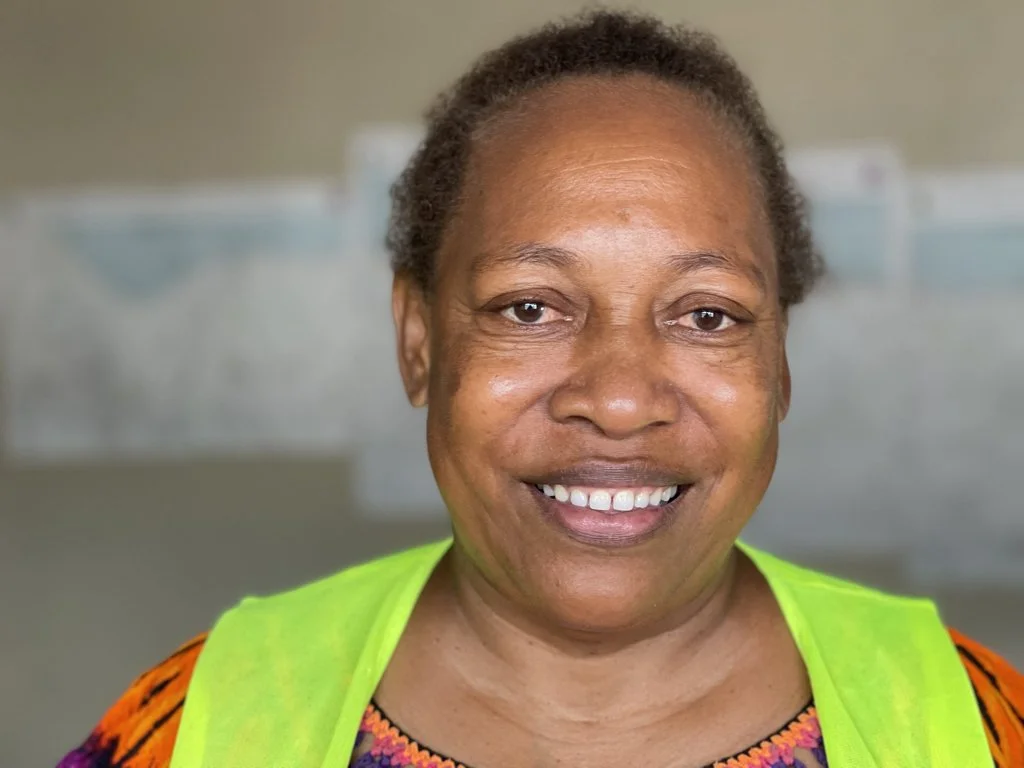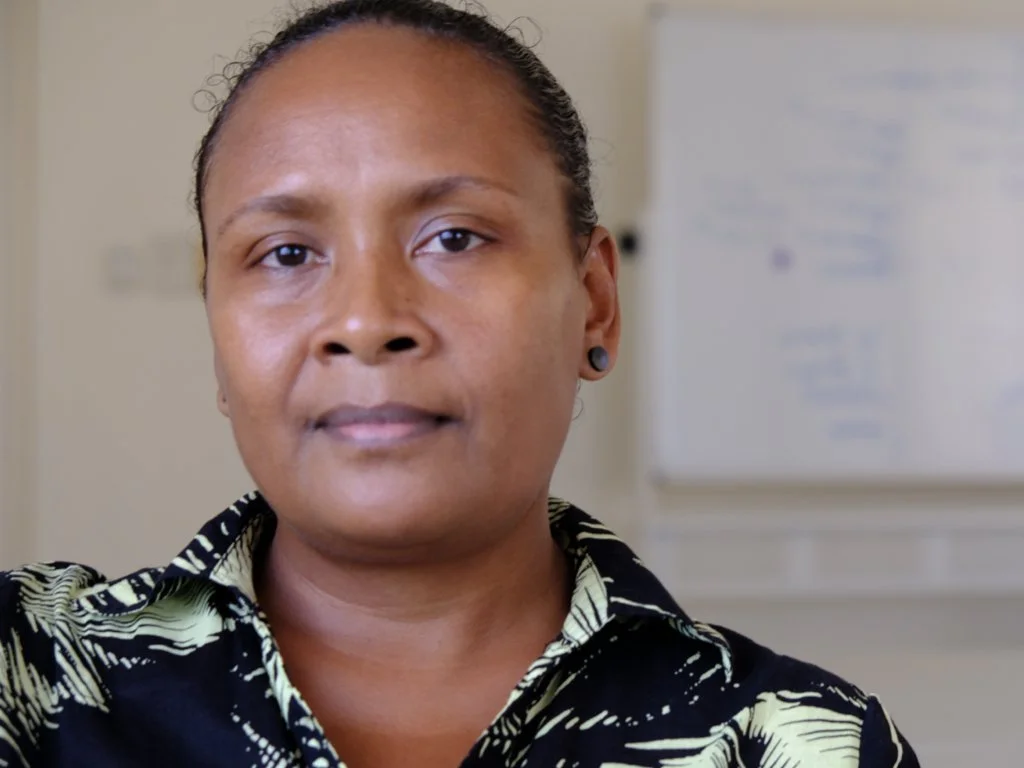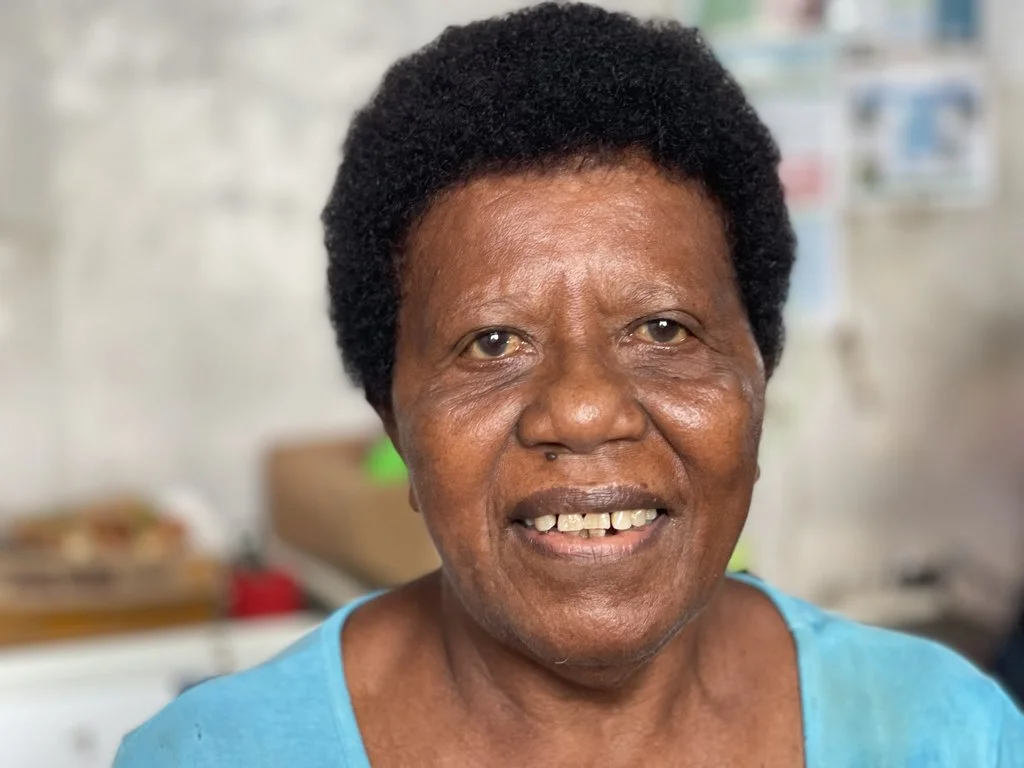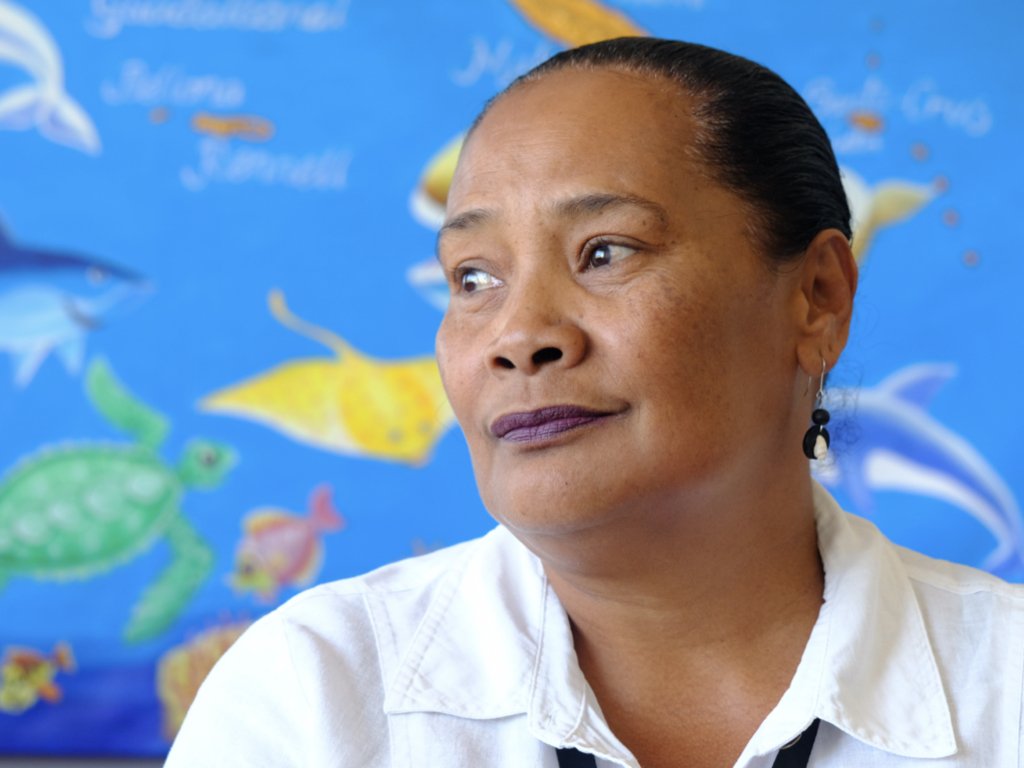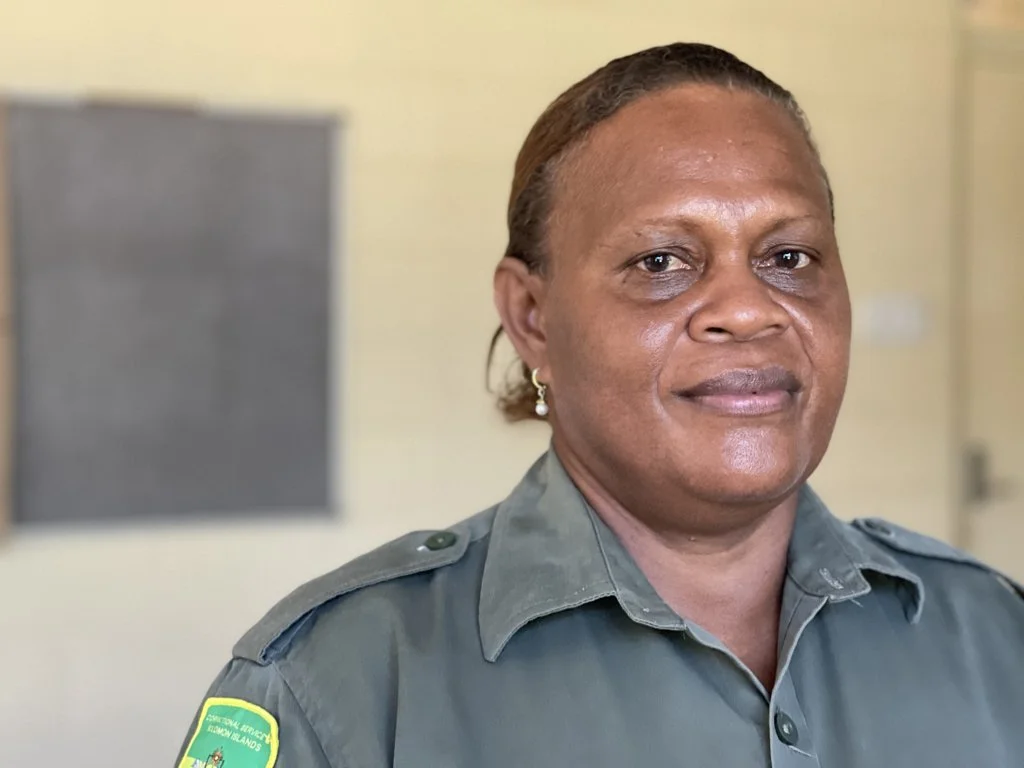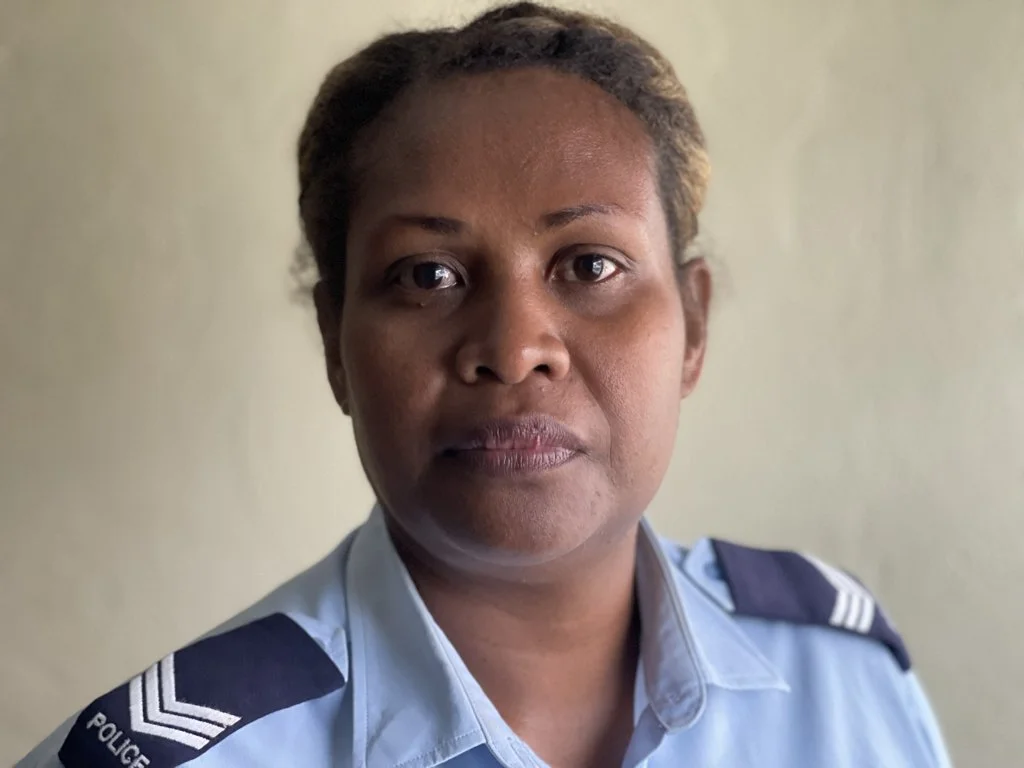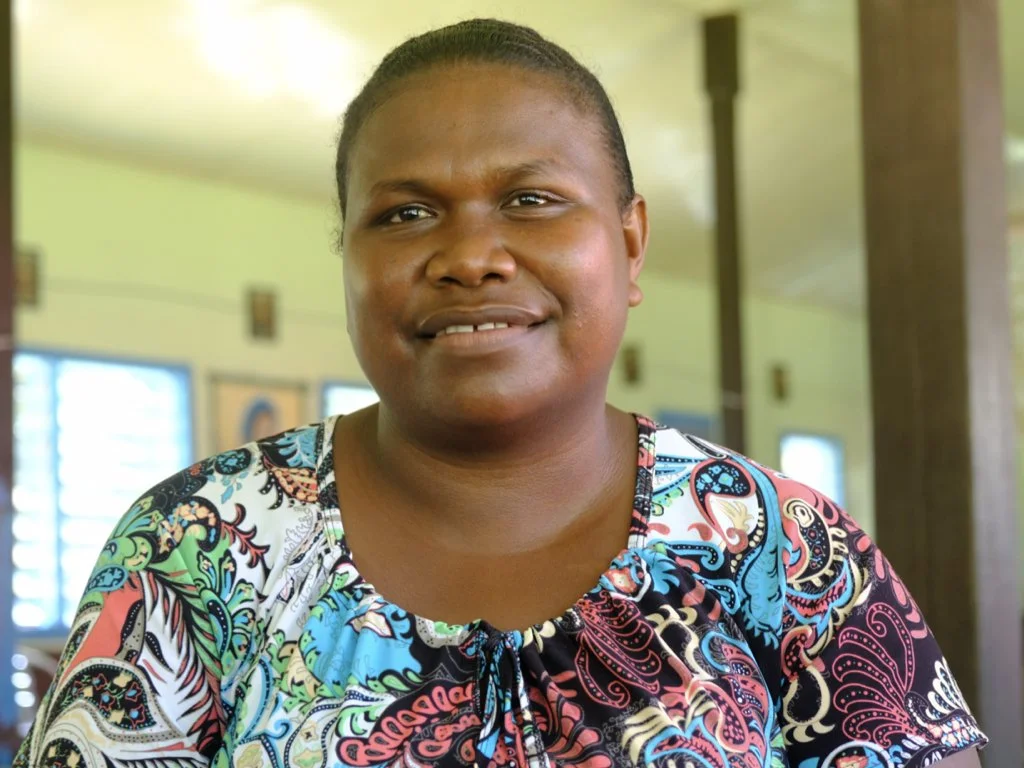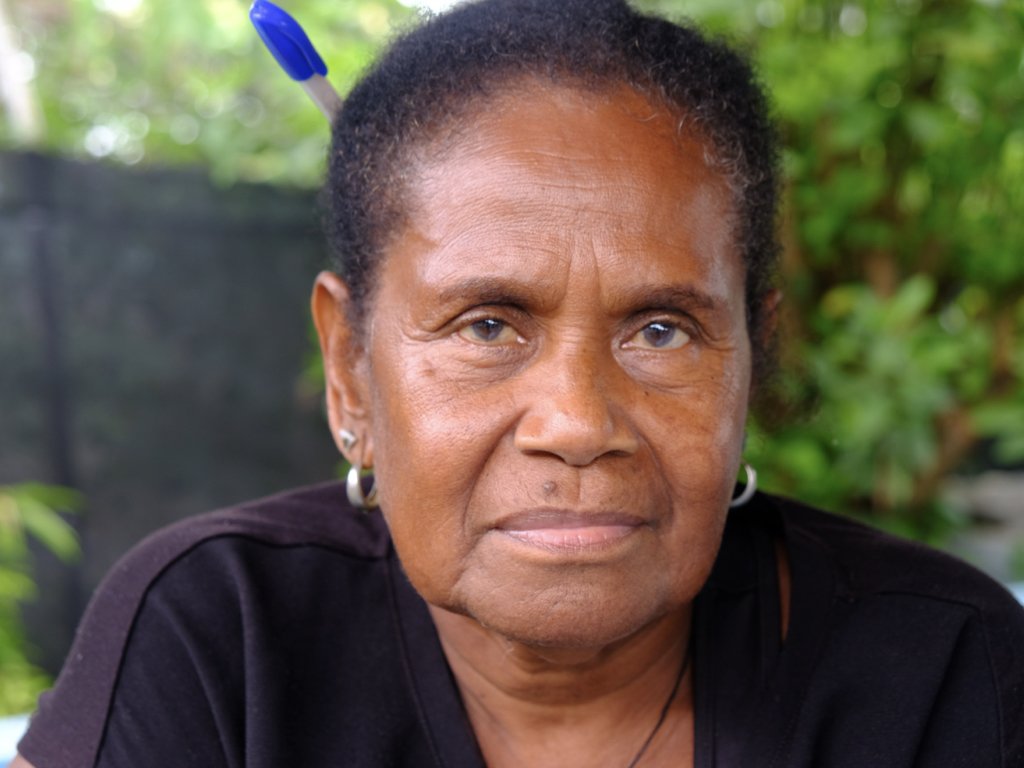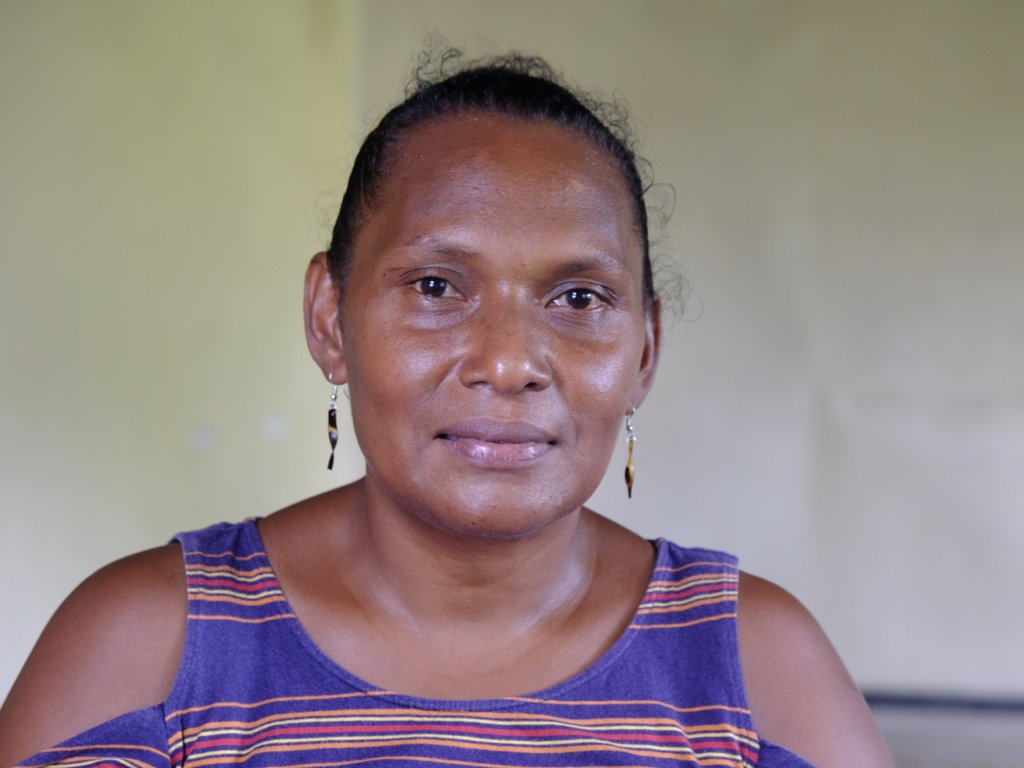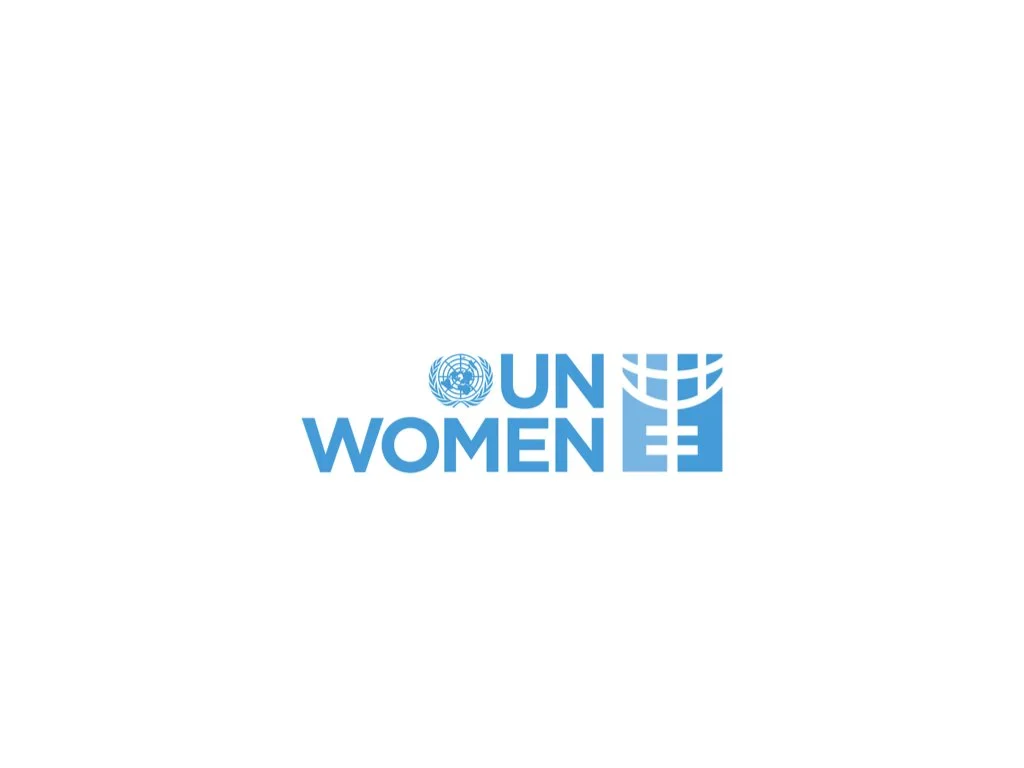Esther Nevenga
Midwife
White River Clinic, Honiara
Focal point for GBV at the clinic and working with young people
“At our youth friendly health corner we see young people have violence, but they never talk about it,” says Esther, “ But when they come, they trust somebody and they can say, ‘I face violence.’”
“Now with information going out, women are more open and when they face violence at home they come in and they come and say, “My husband beat me at home.’”
“We have to see whatever treatment we can give. It's a survivor-centred approach. It’s all about the survivor, if she wants to report but we always say that it’s good for the perpetrator to face justice.”
“When I see someone with injuries we do first medical aid and then we do referral counselling. I do it here, but I refer to a family support centre for more counselling.”
“When we go to court, we have to prove that she was raped or sexually abused so we have to have any clinics. We don’t have doctors but we refer them. They need a swab. In the clinic, we do an emergency pill to prevent pregnancy, tests for STIs and HIV, and any first aid treatment.”
“With Safenet survivors are not being asked the same question. We know that when you’re asking the same question it’s traumatising them. If I refer to the family support centre the questions that I’ve already asked they won’t ask again because I’ve already said it in the referral form.”
“Women are empowered to make the right decision
for their safety.”
“Helping them in the healing process that they can speak out they can trust us and we see that it’s easier to be part of the network because we know who to refer to. We found it hard to work with the police, but through the training they came out.”
“We see women coming out and making a decision for themselves and moving on. What motivates me is seeing women through that referral pathway. They come through, and it gives them the strength to make the decision. Women are empowered to make the right decision for their safety.”
“Some women and girls come in here and they’re pregnant. Some of them have been raped and some of them are asking for abortions but we can’t give abortions here in the Solomon Islands.”
“I always talk about the second chance in education. This is to motivate young people to continue on with the pregnancy and complete the pregnancy, get family planning and go back for further studies.”
“Being a midwife, I’ve seen doctors who’ve made reports for those rape cases and you see the report the perpetrator goes away for six months, and then he’s out from prison. Even survivors feel bad about it. they feel they were neglected they feel that the law doesn’t serve them well, because even if you were to report a rape case the law, the sentence, the perpetrator won’t go to the full penalty that they should serve.”
“Women and girls know about their rights,” says Florence Hiroshachi. “Now we know the law and when we face something we speak out.” Florence works with the Royal Solomon Islands Police on the Prosecution Unit. She handles cases of gender-based violence and works with other investigators and legal teams to help survivors access justice.
Kathleen Kohata
Principal Legal Officer
Family Protection Unit, Public Solicitor’s Office Honiara
“Domestic violence is a huge part of what we do at the public solicitor's office,” says Kathleen.
She says the justice system has improved a lot in recent years. “There’s been coordination in the past but now it’s more organised. through Safe Net there’s more coordination between the partners and there's a referral system. there’s more understanding in terms of how we deal with these cases and we respect the boundaries of each organisation. We all knoew what they can do and what they can’t do and how they can operate.”
“It makes the work of people in the system easier and more efficient because you know who you can touch base with to resolve an issue. in the past, you needed to know who to go to.”
“Rates of domestic violence are very high, but sometimes people don’t know about different kinds of violence like psychological violence,” she says. “There’s a lot of work that’s happening, but sometimes they happen in the centres around the capitals of the provinces. It’s not a message that’s going down to all the provinces.”
“With the use of technology and people on social media these types of tools can help people to access information. there’s network coverage out in the provinces. It’s about Having more awareness, but having different tools.”
Kathleen says the speed of handling cases has improved. “If someone experiences violence if she comes to us today we are able to get a protection order provided. The magistrates need 15 minutes to go through the documents and for the court to arrange your hearing time. This is where the system works, and where the family protection act does work.”
Roselyn Talisi Tolia
“Domestic violence is one of the big issues here in the Solomon Islands” says Roselyn. “Women do not speak out and they keep quiet even though they have troubles. Our culture holds back women from speaking out so many do not access justice.”
As an officially Prescribed Person by the justice department, Roslyn deals with women that face domestic violence. We can give awareness to these women,” she says. “There is a way to access justice: never keep quiet, there are ways we can find to help you.”
Sister Doreen Awaiasi
Christian Care Center, Auki
“We are providing a safe home, “ says Sister Doreen. “We are providing accommodation for rape cases in sexual abuse cases. Sometimes they have experienced traumatic things and it takes time. This is a safe place. The sisters are safe people to live with.”
“Some of the people don’t trust anyone because they were abused by their own relatives. We believe in their stories, we listen to the story when they go to the police. They are traumatised and their minds are all over the place. We help them talk it through. They need to have the story in order.”
“Women find it difficult to come because the distance women come here to Auki is very difficult for them. It’s only people who have money who can come and access justice here.”
“Some of the girls are five and six years old. It's an ongoing abuse. When I support them I know that they’re very traumatic experiences that they have been through. It’s important to know exactly how to help them.”
Lorah Kwanairara
Legal officer , Family Support Center
“When women and girls come in, they need protection from domestic violence, so we take it to court,” Lorah says. “We apply for child maintenance and child custody and access. We assist victims so that the perpetrators assist their children. When domestic violence occurs the children are always left behind.”
“We conduct workshops and do training. We do other units where we go together, do the training specifically on the legislation that’s what we specialise in and how the victims can do reporting through the Safenet referral system.”
“We help victims women and girls access services. Whenever they access services they access justice.”
“Some of them don’t know how to read so they can’t access the information that’s on the website so we have this survivor centred approach. The legal system is quite complicated for a person to understand. We make sure that when women come in, they understand laws if they know the steps so they get what they need.”
“Most victims usually fall out of the process because there’s pressure from the family and whenever they get pressure from the family they settle it they try to cancel the court process. When people drop out of the legal process, we say OK come back next time and keep it open and so the next time it happens. We always keep the door open.”
Valerie Babalu
Criminal registry, Magistrates Court Honiara
Valerie works in the criminal registry at the magistrates court in Honiara. She has no formal legal training but has become skilled at the documentation needed for criminal prosecutions. She works closely with the police to process the paperwork to seek prosecutions in court. Valerie knows the archive and the filing system inside out and says it’s satisfying when they are able to action cases. Valerie says it’s deeply upsetting to read the cases files with descriptions of women being beaten abused and sometimes murdered. She can see how the detailed reports lead to more convictions.
Everlyn I’io
Midwife, Malaita
Evelyn is a Midwife in North Malaita. She is trained to identify cases of gender based violence in patients and help them seek support and safety.
She shared a story about a girl who she found in North Malaita, who was locked in a cage with pigs. The girl was epileptic and her guardian thought she was cursed so they had locked her in a cage for four years. Evelyn tried to rescue the girl but came back with police. “I’m often in dangerous situations where I worry about my safety. As I went to that house to rescue the girl I was grateful to have the police with me.”
Everlyn tells how the girl was taken to Honiara for medical treatment and counselling. Her guardian was given a warning and agreed not to lock her in a cage anymore and she is now back home with him and taking medication for her epilepsy.
Despite the reluctance of some nurses to sign medical statements or forms related to the justice system, Evelyn says she does so because she knows how important it is for survivors.
Tearo Beneteti
Magistrate
Tearo Beneteti team is the magistrate judge in Honiara. She’s from the Micronesian community Kawaki in Isabel province. She says the family protection act gives her important tools to help adjust the justice system to fit the situation. She shares the story of a case where she sentenced the man to do two months of washing dishes, as a way of discouraging the bad behaviour. The woman survivor later said to her that it really helped her Change the dynamic in their relationship.
Julie Hitu Hatai
Nurse
Julie is a nurse in North Malaita . She is responsible for training local nurses in all the skills that they need to be effective healthcare providers. She says one of the great frustrations that she has is the reluctance of nurses in Malaita to get involved in signing medical statements, or filling out the paperwork on cases of domestic violence or sexual violence when they come to the hospital, and she says they have done the training again and again,. Nurses continue to ignore some of the steps through reluctance to get involved in a complicated and perhaps lengthy process that where they don’t want to be witnesses in a community where family loyalties and family allegiances are extremely important.
Margaret Suifa'asia
Department of Prosecution
Margaret is the chief prosecutor at the Department of Prosecution in Honiara. Her theory of how to get more prosecutions is to improve the quality of testimony. She has worked with the courts to push for a greater acceptance of child friendly approaches, and survivor centred approaches to testimony.
The Department of Prosecution has a child friendly space in the office now where women and girls can tell their story in a more relaxed environment. Margaret has pushed the court to allow for video conference testimony, the theory, or the idea is to improve these testimonies as a way of leading to better outcomes in the justice system.
Maria Kopie
Maria is from the Visale in West Guadalcanal. She attended a workshop hosted by the Access to justice program. She says they’ve been talking about gender based violence for years now in the community and despite all the workshops, violence continues to happen. Every weekend she says women are beaten with shovels, with machetes and dragged by their hair. Maria says they call the police and are told the police cannot come because it’s too far and they don’t have transport. She wishes that she had more money so that she could build a small house on her land where the police could come and have their own set of guest houses or an informal police station in their community because she thinks that that would help to discourage this violence in her community.
Moreen Sariki
Moreen is part of markets for change. The Honiara market used to be a dangerous and chaotic place without designated areas. Fish vendors were competing with fruit vendors for space, and fights often broke out. Moreen helped found markets for change, so that women would have an organised voice in negotiating with the Honiara city Council that manages the market space. Through this collective organisation, they have thought for better sanitation systems, better rules, clear reporting of complaints and organised sectors in the markets so there are less disputes.
She says they are the frontline of gender–based violence. Sometimes when they look out for each other in the market and help identify cases of women who may be experiencing hard times they help them, refer them to the right support within the SafeNet system.
Andella Maria
Counsellor
Family support centre
“Working at the family support centre is hard. We have women and girls coming in with cases of violence so the services that we’re providing we are counselling legal advice.”
“Before the family protection act women and girls didn’t come in,” says Andella. “With the family protection act, they feel they’re being protected by the services they’re always helping them find the perfect back from the situation before and the situation. Now a lot of women come in daily and children come.
“A lot of people know about gender-based violence, information to go around the country, go to the provinces in the provincial settings, do committees where people have awareness information sharing, so women are aware of gender-based violence.”
“Working at the family support centre is hard. We have women and girls coming in with cases of violence so the services that we’re providing we are counselling legal advice.”
Inside safe services like police public solicitors, we all work closely with victims. Now a lot of services that were available before were just at the police and that services are available for women and girls who’ve experienced violence.”
The importance of counselling is to come out, and to share the thing and the problems that they’ve had inside so long they haven’t talked about or told any trusted friend. They’ve been keeping these problems to themselves. counselling helps them come out and talk about it to make them stress-free from those experiences. And counselling helps people think about a way out in the next steps.”
“In my experience, nobody reports the violence on the first time it takes years of experience in violence before people come in and report
Ileen Gelisua Is part of Markets for Change in Auki. She says she often witnesses violence in the market. Sometimes there’s disputes between women about fees or fights over money, or men come in and abuse their wives in the marketplace. Ileen says she had to intervene enough in a dispute between a husband and wife, and tell them not to bring their domestic issues into the market. Eileen then had to go and get the security guard and shouted at him and said, “Do your job!”
Hellen Bennett
Department of Prosecution
Helen works at the department of public prosecution. Her job is to make sure the survivors know exactly what’s happening in the process she meets with the lawyers and other members of the prosecution team. Helen is the continuous point of contact; she helps him get two different courthouses on the right day she arranges transport. She helps me understand the process in a language that they can understand.
Priscilla Moli
Auki Prison
Priscilla works in the corrections department in Malaita. She works inside the prison in Auki where some of the most violent cases of gender-based violence occur. Priscillia sits with the perpetrators over multiple sessions and listens to their stories. She also helps them in the healing process; she helps them understand what they’ve done and find ways to transform. She says that women act as a ‘cooling agent’ inside the prison. Priscilla fights can often break out. Women can help defuse Tempers and seek peace. She says that her role in helping these men transform is critical to real and lasting justice in the community so that they don’t get out of prison and reoffend.
Samantha Kikoni is responsible for the capacity building of her colleagues to handle domestic violence cases she organizes workshops trainings with her colleagues, so that they can be better equipped to take testimony, in cases of rape for sexual violence.
Kyla S. Venokana
Ministry of Justice
Kyla is a lawyer with the Ministry of Justice and her job is to make the family protection act a reality. She is working on a suggested sentencing for cases of gender based violence she says there’s a long way to go because they are not Properly resourced to go and deliver services outside of Honiara.
Susie Deke works at Seif Ples, a shelter for survivors of gender based violence in Honiara. “Women come in with bruises,” she says. “Sometimes women come with black eyes or broken arms. We have a nurse on call to deal with cases so survivors can avoid long waits at the hospital after their trauma.”
Seif Ples is the frontline in the Safenet referral system. Susie and her team help women access medical, legal or counselling support so they can catch their breath and plan their next steps towards safety after experiencing violence.
Serah Ladota
Malaita
Serah is a prescribed person who has applied to become an Authorised Justice, and if approved by the magistrate she will be the first woman Authorised Justice,in Malaita province. She is a key focal point for women in the community to report cases of domestic violence. She helps women access a protection order and then seek shelter. Serah can accelerate that process for women so that they don’t have hesitations to report. “If cases are not handled quickly then women withdraw the complaint and there is no justice,” she says. “These cases have to be given priority.” Serah is the first step in the referral process for the Safenet Network to help women access police counselling, and legal support.
Learn more
